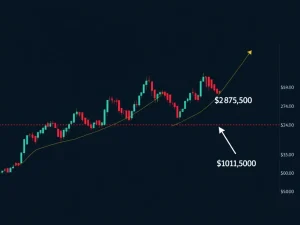Explosive Bitcoin News: JPMorgan Accused of Alarming Anti-Competitive Tactics

In a financial landscape increasingly shaped by digital assets, a significant conflict is brewing that demands the attention of every crypto enthusiast. Recent **Bitcoin News** has brought to light serious accusations against one of the world’s largest financial institutions, JPMorgan Chase & Co. The banking giant stands accused of employing anti-competitive tactics aimed at stifling the very crypto advocacy that underpins the burgeoning digital economy. This isn’t just a corporate spat; it’s a critical moment highlighting the tension between traditional finance and the decentralized future.
The Allegations Against JPMorgan: Halting Crypto Advocacy?
The core of the controversy centers on **JPMorgan**’s alleged strategies to suppress the growth and reach of cryptocurrency platforms. Critics, most notably Gemini co-founder Tyler Winklevoss, have publicly accused the bank of imposing burdensome fees on fintech platforms. These platforms are crucial bridges, enabling users to link their traditional bank accounts to crypto exchanges and services, thus facilitating the purchase of digital assets like Bitcoin.
Winklevoss’s claims gained traction following JPMorgan’s decision to halt the re-onboarding process for Gemini as a client. This move came after Gemini’s exclusion during what Winklevoss termed “Operation Chokepoint 2.0” – a perceived regulatory campaign designed to restrict banking services to industries deemed “disfavored,” including crypto. He views this as part of a broader effort by legacy banks to erode consumer data rights and impede **Fintech Innovation**.
What Are These Alleged Anti-Competitive Tactics?
The accusations suggest that JPMorgan is leveraging its dominant market position to create barriers for crypto-friendly fintech services. Here’s a breakdown of the alleged tactics:
- Burdensome Fees: Imposing exorbitant charges on fintech platforms that facilitate data access between bank accounts and crypto services. This can make it financially unviable for fintechs to offer crypto-related features.
- Service Restrictions: Halting or refusing to re-onboard crypto exchanges as clients, effectively cutting off their access to essential banking services.
- Undermining Data Rights: Critics argue that by restricting open access to banking data, JPMorgan is undermining consumer control over their own financial information, a cornerstone of modern financial technology.
Such actions, if proven, could force fintech companies to either absorb unsustainable costs or abandon their crypto offerings altogether. This, in turn, would significantly hinder the democratization of finance and limit consumer choice in the digital asset space.
The Paradox: $60 Billion Inflows vs. Suppression Efforts
Perhaps the most striking aspect of this dispute is the apparent paradox it presents for **JPMorgan**. While facing accusations of suppressing crypto, the bank has simultaneously benefited immensely from the digital asset boom. Reports indicate that JPMorgan has seen a staggering $60 billion in net inflows into digital assets year-to-date. This stark contrast raises critical questions:
How can a bank profit so significantly from the crypto market while allegedly engaging in **Anti-Competitive Tactics** to restrict its growth and accessibility for others? This situation highlights the complex balancing act major banks face: participating in the lucrative crypto space while navigating evolving regulatory pressures and maintaining their traditional market dominance.
Why Does This Matter for Crypto Advocacy?
The implications of JPMorgan’s alleged actions extend far beyond just one bank or one crypto exchange. They touch upon fundamental principles of fair competition, consumer rights, and the future trajectory of financial technology. If dominant institutions can use their market power to control access and stifle innovation, it could:
- Centralize Power: Consolidate financial power in the hands of a few entrenched players, contrary to the decentralized ethos of crypto.
- Limit Innovation: Discourage new entrants and innovative fintech solutions that challenge traditional banking models.
- Harm Consumers: Reduce choices, increase costs, and create friction for individuals looking to engage with digital assets.
Tyler Winklevoss has framed JPMorgan’s actions as a “rent-seeking” effort to monopolize data access and “bankrupt fintech and crypto companies.” He has vowed to continue challenging such practices, emphasizing the need for open and fair access to financial services.
The Road Ahead: Scrutiny and Calls for Oversight
The lack of an official public response from JPMorgan regarding these specific claims has left the debate to unfold in public forums, particularly on social media. This has fueled calls for increased congressional oversight and legislative reforms to ensure fair banking access for all legitimate industries, including crypto. The ongoing scrutiny underscores the ethical questions surrounding the use of market power in the financial sector.
This situation serves as a stark reminder of the fragile balance between innovation and institutional power in finance. As **Fintech Innovation** continues to reshape traditional banking models, the interplay between institutional gatekeepers and digital disruptors remains contentious. The outcome of this scrutiny may well determine whether crypto remains a truly disruptive force or becomes increasingly entangled in regulatory frameworks that inadvertently favor entrenched players.
For now, the allegations against JPMorgan highlight a crucial strategic dilemma for legacy banks: how to adapt to a rapidly evolving financial landscape without resorting to practices that could be perceived as anti-competitive and harmful to the broader financial ecosystem. The ongoing debate emphasizes the importance of robust **Crypto Advocacy** to ensure a level playing field for all participants in the digital economy.
Frequently Asked Questions (FAQs)
Q1: What are the main accusations against JPMorgan regarding crypto?
JPMorgan is accused of using anti-competitive tactics, such as imposing burdensome fees on fintech platforms that connect bank accounts to crypto services, and halting client relationships with crypto exchanges like Gemini, allegedly to suppress crypto advocacy and fintech innovation.
Q2: Who made these accusations?
The primary accuser is Tyler Winklevoss, co-founder of the Gemini crypto exchange, who shared his concerns publicly on X (formerly Twitter).
Q3: What is “Operation Chokepoint 2.0”?
“Operation Chokepoint 2.0” is a term used by critics, including Tyler Winklevoss, to describe what they perceive as a regulatory campaign designed to restrict banking services to industries deemed “disfavored,” such as the cryptocurrency sector.
Q4: How does JPMorgan’s alleged behavior contradict its financial gains from crypto?
The contradiction lies in JPMorgan reportedly benefiting from significant net inflows ($60 billion year-to-date) into digital assets, while simultaneously being accused of hindering the growth and accessibility of the crypto market through anti-competitive practices against fintechs and crypto platforms.
Q5: What are the potential implications of these allegations for the broader crypto market?
If true, these allegations could lead to reduced competition, stifle fintech innovation, limit consumer choice, and potentially centralize financial power within traditional institutions. They also highlight the need for greater regulatory oversight to ensure fair banking access for the crypto industry.
Q6: Has JPMorgan responded to these specific claims?
As of the time of the original article, JPMorgan had not publicly addressed the specific claims made by Tyler Winklevoss, leaving the debate to unfold in public forums.










